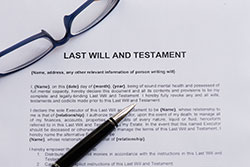|
Important Estate Planning Tips
Tuesday, January 19, 2016

The conversation about a person’s last wishes can be an awkward one for both the individual who is the topic of conversation and his or her loved ones. The end of someone’s life is not a topic anyone looks forward to discussing. It is, however, an important conversation that must be had so that the family understands the testator’s final wishes before he or she passes away. If a significant sum is being left to someone or some entity outside of the family, an explanation of this action may go a long way to avoiding a contested will. In a similar vein, if one heir is receiving a larger share of the estate than the others, it is prudent to have this action explained.
Read more . . .
Monday, January 11, 2016
 The law allows a person preparing a will to have almost complete control over his or her assets after the testator passes on, but there are limits to such power. A person can restrict a property from being sold, or make sure that it is used for a specific purpose. A property can be bequeathed to a family member as long on condition that the person maintains the family business in a specific city, or exercises daily, or places flowers on the deceased's grave every week, or engages in any other behavior the testator desires. This freedom, however, is not without limits. The time limit on this ability is called the rule against perpetuities. The rule is also referred to as the “dead man’s hand” statute.
The rule against perpetuities is complex and rarely utilized. At the time of the passing of the testator, the heirs of the estate are locked in. These heirs are referred to as “lives in being.” For the purposes of this rule, if a child is conceived but not yet born at the time of the testator’s death, it will be considered a life in being. Once the last living heir named in the will passes away, the restrictions on the property will continue in place as the testator desired for 21 years. The idea is that a testator may control his assets for a full generation after his or her death. The rule is notoriously difficult to apply properly. When it does apply, the conditions on the bequest are abandoned and the gift returns to the residual estate.
What makes this rule so confusing is that, when an individual writes a will, he or she may make gifts to potential children or grandchildren. These children and grandchildren, however, may not be born until years later. If a child has been born at the time the decedent passes away, he or she is subject to the restrictions on the bequest during his or her lifetime. If a grandchild is conceived and born after the decedent’s death, however, the child may avoid the restrictions 21 years after the death of the last heir alive at the time of the decedent’s death. There is no way to predict when this might occur. The rule is archaic and easily avoided. A knowledgeable attorney can help a person planning his or her estate set up an equitable trust. Similar to a will, a trust may impose conditions on the use of assets, but is not subject to the rule against perpetuities. There are other advantages to a trust, but one of the most important is avoiding this unpredictable and confusing rule.
Wednesday, December 30, 2015

A tax basis is essentially the purchase price of a piece of property. Whenever that property is sold, the seller must pay taxes on the difference between the sale price and the original purchase price. This concept applies to all property, including stocks, bonds, vehicles, mechanical equipment, and real estate. If debts are assumed along with the purchase price, the principal amount of the debt will be included in the basis. The basis can be adjusted downwards when a person deducts depreciation costs on his or her income tax returns, and may be increased for capital investments towards improving the property that are not deducted for income tax purposes. Selling a property that has been held for a long time can carry a serious tax burden because of inflation, particularly when real estate prices have increased.
When an individual receives property as an inheritance, the tax basis is reset to whatever the fair market value is at the time of the transfer of title. This means that the heir would pay significantly less taxes if that property is sold by the beneficiary than if the original owner were to sell it and devise the money to his beneficiaries. Most simple wills provide that all of a testator’s assets are placed into a residual estate to be divided equally among the heirs. This means that an executor must liquidate the assets of the estate and divide the proceeds among the heirs. However, because there is no transfer of title before the property is sold, the heirs are stuck with the grantor’s basis and they lose an opportunity for a sizeable tax break.
A person planning his or her estate may also reset the basis in his or her property by giving it as a gift directly to his or her heirs or by gifting the property to an inter vivos trust. These actions can have their own tax related consequences, or create other unintended problems for the beneficiaries. Only an experienced estate planning attorney can advise you on the most efficient way to pass your assets on to your heirs.
Monday, December 21, 2015
 When a loved one dies, an already difficult experience can be made much more stressful if that loved one held a significant amount of debt. Fortunately, the law addresses how an individual’s debts can be paid after he or she is deceased.
When a person dies, his or her assets are gathered into an estate. Some assets are not included in this process. Assets owned jointly between the deceased and another person pass directly to the other person automatically. If there are liens on the property at that time, they will stay on the property, but no new liens can be placed on the property for debts in the name of the deceased. Similarly, debt jointly in the name of the deceased and another party may continue to be collected from the other party. In community property states, all assets and debts are the joint property of both spouses and pass automatically from one to the other. The community property states are Alaska, Arizona, California, Idaho, Louisiana, Nevada, New Mexico, Texas, Washington, and Wisconsin.
From the pool of assets in the estate, an executor is required to pay all just debts. This means that, before a beneficiary may receive anything, all debts must be satisfied. Property might be sold to create liquidity in order to accomplish this. If there are more debts than there are assets, the estate must sell of as many assets as possible to pay off the creditors. If there is no money in the estate, the creditor can not collect anything. Rather than force people into this tiresome process, many creditors will agree to discharge a debt upon receipt of a copy of a death certificate or obituary. This is particularly true of small, unsecured debts. Life insurance proceeds were never owned by the decedent and should pass to a beneficiary without consequence to the estate. Proceeds of a retirement account may also be exempt from debts.
If creditors continue harassing the beneficiaries of debtors, they may be violating federal regulations under the FDCPA. They can be held accountable by their actions, either by the FTC, the state attorney general, or a private consumer law attorney.
Monday, November 30, 2015

There are many reasons why a person might leave a spouse or another loved one out of his or her will. It is possible that the will in question was executed prior to a marriage and was never properly updated. It may also be the case that the husband and wife, though still technically married, are estranged, and do not contribute to one another’s support. An end of life revelation of a past infidelity may anger a spouse enough to rewrite his or her last will and testament. Individuals may make rash decisions to disinherit spouses based on a single argument or misunderstanding. This can be exacerbated by symptoms of dementia. Regardless of the reason, a person who is not named in his or her spouse’s will may petition the court for the spousal share to receive a portion of the estate.
The spousal share of an estate, also called an elective share, is a holdover from the concept of dower in English common law. Traditionally, dower is a portion of a man’s estate guaranteed to a wife when she is widowed to ensure that she does not fall into poverty after her husband dies. The practice continues today without the same restrictions on gender. Every state in America has a provision in its laws to protect an individual whose spouse dies from being left with nothing. Similar provisions for children also exist in some states. Attempts have been made to introduce legislation to protect unmarried romantic partners the same way as married couples, but these attempts have had little success.
The structure of these protections vary from state to state. The value of the estate for the purposes of establishing the spousal share may include the widow’s assets depending on the jurisdiction. Some states provide a widowed spouse a larger share of the deceased’s estate than others, but almost every state prohibits an individual from disinheriting a spouse entirely. The one state that does not permit an elective share to the spouse in a probate case requires that an estate pay a disinherited spouse financial support for up to one year after the death.
Monday, October 26, 2015

There are several reasons that a will may prove invalid. It is important for testators to be aware of these pitfalls in order to avoid them.
Improper Execution
The requirements vary from state to state, but most states require a valid will to be witnessed by two people not named in the will. Some jurisdictions require the document to be notarized as well. Although these restrictions may be relaxed if the will is holographic (handwritten), it is best to satisfy these requirements to ensure that the testamentary document will be honored by the probate court.
Lack of Testamentary Capacity
Anyone over the age of 18 is presumed to understand what a will is. At the end of life, individuals are often not in the best state of mind. If court finds that an individual is suffering from dementia, is under the influence of drugs or alcohol, or is incapable of understanding the document being executed for some other reason, the court may invalidate the will on the grounds that the individual does not have testamentary capacity.
Replacement by a Later Will
Whenever an individual writes a new will, it invalidates all wills made previously. This means that a will might be believed to be valid for months until a more recently executed document surfaces. The newest will always takes precedence, controlling how assets should be distributed.
Lack of Required Content
Every will is required to contain certain provisions to carry out its purpose. These provisions, ensure that the testator understands the reason for executing the document. Although these provisions vary from state to state, some are common to all jurisdictions. It should be clear that the document is intended to be a will. The document should demonstrate an individual’s wishes in regard to what should happen to his or her property after death. A proper will should also include a provision to appoint an executor to act as an agent for the estate and enforce the terms of the will. If the document lacks any of these provisions, the will may be declared invalid.
Undue influence or fraud
A will that was executed under undue influence, coercion or fraud will be invalidated by a court. If a will has been presented to a testator for a signature as if it were any other document, like a power of attorney or a business contract, the court will find that the will was fraudulently obtained and will not honor it. If an individual providing end of life care with exclusive access to the testator threatens to stop care unless a will is modified, that modification is considered to be the result of undue influence and the court will not accept it.
Monday, October 19, 2015

If you are about to begin the estate planning process, you have likely heard the term "funding the trust" thrown around a great deal. What does this mean? And what will happen if you fail to fund the trust?
The phrase, or term, "funding the trust" refers to the process of titling your assets into your revocable living trust. A revocable living trust is a common estate planning document and one which you may choose to incorporate into your own estate planning. Sometimes such a trust may be referred to as a "will substitute" because the dispositive terms of your estate plan will be contained within the trust instead of the will. A revocable living trust will allow you to have your affairs bypass the probate court upon your death, using a revocable living trust will help accomplish that goal.
Upon your death, only assets titled in your name alone will have to pass through the court probate process. Therefore, if you create a trust, and if you take the steps to title all of your assets in the name of the trust, there would be no need for a court probate because no assets would remain in your name. This step is generally referred to as "funding the trust" and is often overlooked. Many people create the trust but yet they fail to take the step of re-titling assets in the trust name. If you do not title your trust assets into the name of the trust, then your estate will still require a court probate.
A proper trust-based estate plan would still include a will that is sometimes referred to as a "pour-over" will. The will acts as a backstop to the trust so that any asset that is in your name upon your death (instead of the trust) will still get into the trust. The will names the trust as the beneficiary. It is not as efficient to do this because your estate will still require a probate, but all assets will then flow into the trust.
Another option: You can also name your trust as beneficiary of life insurance and retirement assets. However, retirement assets are special in that there is an "income" tax issue. Be sure to seek competent tax and legal advice before deciding who to name as beneficiary on those retirement assets.
Monday, October 5, 2015
9184.jpg)
The bond between a grandparent and grandchild is a very special one based on respect, trust and unconditional love. When preparing one’s estate plan, it’s not at all uncommon to find grandparents who want to leave much or all of their fortune to their grandchildren. With college tuition costs on the rise, many seniors are looking to ways to help their grandchildren with these costs long before they pass away. Fortunately, there are ways to “gift” an education with minimal consequences for your estate and your loved ones.
The options for your financial support of your heirs’ education may vary depending upon the age of the grandchild and how close they are to actually entering college. If your grandchild is still quite young, one of the best methods to save for college may be to make a gift into a 529 college savings plan. This type of plan was approved by the IRS in Section 529 of the Internal Revenue Code. It functions much like an IRA in that the appreciation of the investments grows tax deferred within the 529 account. In fact, it is likely to be "tax free" if the money is eventually used to pay for the college expenses. Another possible bonus is that you may get a tax deduction or tax credit on your state income tax return for making such an investment. You should consult your own tax advisor and your state's rules and restrictions.
If your granddaughter or grandson is already in college, the best way to cover their expenses would be to make a payment directly to the college or university that your grandchild attends. Such a "gift" would not be subject to the annual gift tax exemption limits of $14,000 which would otherwise apply if you gave the money directly to the grandchild. Thus, as long as the gift is for education expenses such as tuition, and if the payment is made directly to the college or university, the annual gift tax limits will not apply.
As with all financial gifts, it’s important to consult with your estate planning attorney who can help you look at the big picture and identify strategies which will best serve your loved ones now and well into the future.
Monday, September 28, 2015

Estate planning is designed to fulfill the wishes of a person after his or her death. Problems can easily arise, however, if the estate plan contains unanswered questions that can no longer be resolved after the person's demise. This can, and frequently does, lead to costly litigation counter-productive to the goals of the estate. It is important that will be written in language that is clear and that the document has been well proofread because something as simple as a misplaced comma can significantly alter its meaning.
Planning for every possible contingency is a significant part of estate planning. Tragic scenarios in which an estate planner’s loved ones predecease him or her, though uncomfortable, must be considered during the preparation of a will to avoid otherwise unforeseen conflicts.
Even trained professionals can make significant mistakes if they are not well versed in estate planning. An attorney who practices general law, while perfectly capable of preparing simple wills, may not understand the intricacies of trusts and guardianships. A great many attorneys, not aware of the tax consequences of bequests involving IRAs, may leave heirs with unnecessary financial obligations. If an attorney is not knowledgeable enough to ask the proper questions, he or she will be unable to prepare an estate plan that functions efficiently and ensures the proper distribution of the estate's assets.
In spite of the wealth of an individual, the estate may be cash deficient if that wealth is tied up in assets at the time of the individual's death. Problems can also result if an estate planner has distributed assets into joint bank accounts or accounts with pay on death provisions. If the executor of the estate does not have access to funds to pay the estate's bills or taxes, the heirs of the estate may run into trouble.
Even if estate planning is handled well from a logistical point of view, lack of communication with loved ones can interfere with a will's desired execution. A tragedy that incapacitates the testator can occur suddenly, so it is imperative that a savvy estate planner confers with loved ones as soon as possible, making them aware of any future obligations, such as life insurance premiums that must be paid and informing them of the location of any probate documents and inventories of assets. Such conversations ensure that the individual's wishes will be carried out without complications or delay in the event of an unexpected incapacity.
In addition to communicating logistical information, it is also essential to schedule a personal conversation with loved ones that makes clear any sentimental bequests or large gifts that require explanation. This avoids the shock or discomfort that may arise after one's death during which a well-thought-out decision is questioned as impulsive or irrational. Such direct communication of one's plans avoids unnecessary envy, arguments or rivalry among family and friends.
Consulting with attorneys who specialize in estate planning is the cornerstone of creating a plan to ensure that one's desires are carried out and that all the bases are covered. Estate planning attorneys serve as invaluable repositories of all information necessary to strategizing a plan that not only meets one's personal needs and desires, but is legally binding.
Monday, September 14, 2015

How can I control my assets after death?
The practice of estate planning is dedicated to preserving an individual’s control over his or her assets after death. A simple will can control which individuals receive what assets, but a more thorough plan has the potential to do much more. Establishing a trust is the most common method used to exercise this kind of control.
A trust can issue a bequest restricted by a condition; for example, a trust might be established to pay out $10,000.00 to a specific grandchild only once he or she has reached 18 years of age. Multiple payments can be made to the beneficiaries as long as the trust is funded. The trust can stipulate that the grandchild may have to graduate from college to receive the money, or even that he or she must graduate from a specific school with a minimum grade-point average or membership in a particular fraternity or sorority.
A trust can make the condition of payment as specific or as broad as the creator of the trust wishes. It may, for instance, bequeath benefits to a humanitarian organization on condition that the organization continues to provide food and shelter to the homeless. There is no limit to the number of conditions permissible in a trust document. Even when the conditions go against public policy and general norms and mores established by society, as long as the conditions may be met legally, they will be upheld by the court.
In order to create a trust, there must be a capital investment to fund it and a trustee must be named. The trustee is responsible for protecting the assets of the trust, investing them to the best of his or her ability, managing real estate and other long-term assets, interpreting the trust document, communicating regularly with the beneficiaries of the trust and performing all of these actions with a high level of integrity. Trust assets may be used to pay for expenses of managing the trust as well as to provide a stipend for the trustee if so provided for in the trust document.
If a trust document is not well written, it may be the target of a lawsuit seeking to dissolve the trust and disburse the assets held therein. Even if the trust is defended successfully, the costs of this challenge may deplete its coffers and frustrate the very reason for its creation. In order to avoid these possible pitfalls, it is imperative that a trust document be drafted by an attorney with a high degree of experience in estate planning law.
Monday, September 7, 2015

Will - a written document specifying a person’s wishes concerning his or her property distribution upon his or her death.
In order to be enforced by a court of law, a will must be signed in accordance with the applicable wills act.
Testator/Testatrix - the person who signs the will.
Heirs - beneficiaries of an estate.
Executor/Executrix - the individual given authority by the testator to make decisions to put the testator’s written directions into effect.
Once the will is entered into probate, the executor’s signature is equivalent to the testator’s. The executor has a legal duty to the heirs of the estate to act in the best interest of the estate, and may collect a fee for performing such service.
Administrator/Administratrix - the person who assumes the role of the executor when a person dies without a will (intestate).
The Administrator must apply with the local probate office and may be required to provide a bond to be held in escrow as collateral for control over the assets of the estate.
Codicil - an amendment to a will.
In order to be valid, a codicil must comply with all the requirements of the applicable wills act.
Holographic Will- a handwritten will.
Holographic wills are often exempt from requirements of the applicable wills act.
Bequest - a gift given by the testator to his or her heirs through a will.
Residual Estate - the balance of a testator’s belongings after debts have been paid and specific bequests have been distributed.
Intestate - not having signed a will before one dies; a person who dies without having signed a will.
Life Estate - a bequest that gives an heir the right to have exclusive use of a property for the remainder of his or her life, but without the power to transfer such property upon the death of that heir.
The property will transfer to the heirs of the residual estate after the death of the beneficiary of the life estate.
Per stirpes - a Latin phrase precisely translated as “by the branch” meaning that, if an heir named in the will dies before the testator, that heir’s share will be divided equally among that beneficiary’s own heirs.
An alternative to per capita, described below.
Per capita - a Latin phrase precisely translated as “by the head” meaning that, if an heir named in the will dies before the testator, that heir’s share will be divided among the testator’s remaining heirs.
An alternative to per stirpes, described above.
While it is a good idea to have a basic understanding of fundamental estate planning vocabulary, this cannot serve as a substitute for the services of an experienced attorney.
Attorney Irene V. Villacci represents clients throughout Nassau and Suffolk Counties and the surrounding areas, including: Queens, Brooklyn, Staten Island, Bronx and Manhattan.
Prior results do not guarantee similar outcome.
|

|
|
|